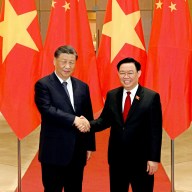 Ryan Hugh Mackey, far right, stands with his producing partner on “A Gentleman’s Guide to Love and Murder,” John Pinckard, at the 25th anniversary of “The Phantom of the Opera” with its director, Hal Prince, center.
Ryan Hugh Mackey, far right, stands with his producing partner on “A Gentleman’s Guide to Love and Murder,” John Pinckard, at the 25th anniversary of “The Phantom of the Opera” with its director, Hal Prince, center.
Credit: Provided
“A Gentleman’s Guide to Love and Murder” opened on Broadway to modest fanfare on Nov. 13, 2013. Although curious crowds and word-of-mouth kept the under-the-radar new musical running for months, it wasn’t until the production earned a surprising 10 Tony Award nominations in April — the most of any show —that people really began to sit up and take notice. On June 8, “Gentleman’s Guide” took home four statues.
But what’s really remarkable about this sleeper hit is the story behind the fully realized production that’s now attracting full houses each night. It took years of hard work — and a few very dedicated people who wouldn’t quit on a project they believed in — to get the show to Times Square.
We spoke to Ryan Hugh Mackey, one of the musical’s original producers, about what it takes to succeed in the harsh world of show business. His involvement began with a phone call.
So this entire wild ride started with one fateful phone call?
In August of 2008, I was working in the subscription sales department of The Public Theater. Not terribly exciting, or financially lucrative, but I needed the extra dough. One day I cold-called this guy, and instead of my usual sales pitch I proceeded to insult him: “You’re gay, and you love musicals. You should buy a subscription!” He responded, “You’re presumptuous, and I write musicals.” Being a budding producer, and fearing he could report me, I quickly changed course and asked for his show’s pitch. That show was “A Gentleman’s Guide to Love and Murder,” and the man on the phone was the composer, Steven Lutvak.
At this point in my career, I didn’t have anything yet — I had a lot of ideas, but nothing was really jelling — so this phone call, and speaking with Steven excited me. It felt like “Little Shop of Horrors” meets “Sweeney Todd” and it was like “Okay, these are two of my favorite shows. Let’s talk, let’s meet, I don’t know what I could do, but I would love to help you.” So we met a couple weeks later. Not only did I make a sale, I made a friend and I found a show that I love.
When you saw the workshop, did you love it immediately?
I knew I wanted to be a producer on the show right away. After reading it and listening to it, I knew it was good. It’s well crafted, it’s been worked and reworked so many times —not because it didn’t work, but because we had all this time to refine things. When I watched the show, I knew immediately it was something I want to do. It’s a classic Broadway musical. I knew it was good. You can just tell. You can just tell. … The lyrics are creative, it’s lyrical, they play with lyrics. Maybe I’m being a little pretentious, but I think that “Gentleman’s Guide” is just a well-written, well-crafted, well-directed, well-acted show.
 “A Gentleman’s Guide to Love and Murder” won four Tony Awards last Sunday.
“A Gentleman’s Guide to Love and Murder” won four Tony Awards last Sunday.
Credit: Joan Marcus
Tell us about the show itself.
I initially thought it was a revenge musical — and it kind of borders on that, but it’s not. It’s about a very poor young man [Monty, played by Bryce Pinkham] who finds out that he’s ninth in line to inherit vast. And the woman that he loves will not marry him because he has absolutely nothing. But he is so in love with this woman that he literally, in a fluke of events, decides to start offing family members so he can get closer and closer to winning that title. And he succeeds. It’s very simple. … I love Monty because it’s a simple want: “I want the woman that I love, and to get her I have to have money.” And in another way, it is a revenge story; [his] mother was slighted by his family, all because of love. So it’s love and revenge, it really is. How far will you go to win the hand of the one that you love?
Do you relate to the story personally?
While working in theater, I’m also working with billionaires, and in a way I kind of felt that way about society: “I don’t have anything, but I deserve something.” Not that I advocate murder, but I could identify what he was going through. It’s like you’re struggling to live your life, and the people that [you] work for are not miserable or mean or anything like that, but it just feels like, “I want what you have, and I’m going to do amazing things with what you have. I can do this.” I totally related to Monty, in a way. I didn’t have to kill people, but I totally related to what his struggle was, because I think a lot of us do struggle. I know a lot of my family plays the lottery, thinking that that will be the answer, that money’s going to solve everything. It works out for Monty, but it doesn’t really work out in real life. This is a cartoon version of life.
Did you always know you wanted to be a producer?
There are a lot of us who have their Broadway dreams of doing something and entertaining people or being onstage. I’ve dreamed of the day that I could do my first musical on Broadway. I’ve been offered many positions on other shows to be a co-producer, and I’ve never really wanted to do it because it just didn’t feel like it was mine. And this, this was a discovery to me. In a way I found it, it was supposed to happen. It felt like fate. I don’t believe in fate but it felt like it. [Laughs.] If I hadn’t called Stephen, I wouldn’t have a show on Broadway. To me it’s like: This was the way it was supposed to be.
And now you’re nominated for a Tony Award.
I knew eventually it was going to happen. I’ve always known that I was going to be a Tony-nominated producer. I hope I’m going to be a Tony-winning producer, but it’s not so hard to become a Tony-nominated producer. It can be frustrating in this business, because there can be a lot of hurdles to jump, and a lot of people get burned out by jumping over them, so I feel very grateful for having navigated it — not so much jumping it, but just getting around the way I could. I’m not well connected in the industry. Now a lot of the higher-ups, the big producers, know that I was pushing the show because nobody else wanted it — so that’s good enough for me. They know that I’m persistent in the way I work. If I find something that I want, I work for it. So yes, I might win a Tony Award, but I’ve also proven for those few that I’m a nominee — I can do it. I just need an opportunity to do it.
What are the traits of a producer?
You have to love theater. You need tenacity, persistence, hard work, be willing to sacrifice the things that you really want for the things that you really want. You have to want to produce theater; you don’t come into this going “I’m going to make $10 million by producing ‘Wicked.’” You’re going in as “I want to try and do the shows I want to see onstage — and convince other producers and investors that it’s worthy.” That’s really what a producer does. You don’t have to have money, which is a misconception in this business, but you need to know people that know people who have money. It’s all about networking. … And you have to know when it’s not working. It might be just the script, the storytelling. If the story’s not working, if the story’s not resonating with you, then it probably won’t resonate with audiences. So the understanding of the way musicals and plays are structured, written, how long they take — it’s simple, but it’s actually very, very important.
So you don’t have to be independently wealthy.
Thankfully, a lot of friends I know are in the finance world. They didn’t have money back when I started this project, but now they do and now they’re investing. I have a couple are in “Hedwig,” a couple in “Of Mice and Men” and a couple are in “Gentleman’s Guide.” I mean, I’ve been to general finance networking things just to kind of go, “Hey, I’m from the Broadway world, a lot of people don’t really know what this is, but this is no less than investing in the stock market. It’s a gamble, make it work.” And it all depends on the product that I’m selling. So those kinds of things help. And joining the Broadway League, that’s always a good thing.
 The cast of “A Gentleman’s Guide to Love and Murder” posed together following the Tony Awards at Radio City Music Hall.
The cast of “A Gentleman’s Guide to Love and Murder” posed together following the Tony Awards at Radio City Music Hall.
Credit: Getty Images
What would you say to someone who wanted to be a producer?
A producer is someone who is not afraid to take risks —someone who has a vision and is confident in their ability to make it happen. That’s what I feel that I am. I’m not afraid to take a risk. I do feel like I have vision. Like the next projects that I have are very cool, and they’re born out of my silly head. So I think that that, as a creative producer, you have to have a vision and convince others to come on board —and collaborate. It’s not even they have to do your vision, you have to be willing to collaborate. I do think that’s the most important thing. And it’s actually the most fun, just being in a room. … [But you have to know] things don’t always work out the way you want. You just have to keep going.
What are those shows you’re working on?
The next show that I’m doing is about a brothel in Chicago in the turn of the century. It’s a true story about two sisters that open up the most opulent brothel this country, maybe even the world, had ever seen. And they did this on their own. They didn’t have any men. They paid off all the men, like the politicians, the henchmen in the area, all of that — they did all of the things that they were supposed to do at the time. And they didn’t give up. They didn’t let society tell them no at a time when women had a few options: You were a housewife, shop girl, secretary or prostitute. They wanted to have money, and they were so unbelievably successful they ran the house for 10 years. When they finally were closed by the city — the city closed down the whole sex district — they packed $400,000 worth of antiques (this was 1911) and a million dollars in cash and they moved to the Upper West Side of New York and became little old ladies and started a poetry circle. So it’s an unbelievable true story that nobody knows — but that everyone should know. They proved that it wasn’t impossible. So those are the kinds of things that excite me: Stories that people don’t know.
(Watch the opening night interviews from “A Gentleman’s Guide to Love and Murder,” provided by Metro NY’s content partnership with The Broadway Channel. And be sure to follow T. Michelle Murphy on Twitter: @TMichelleMurphy.)
















